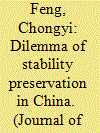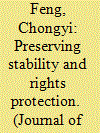| Srl | Item |
| 1 |
ID:
121251


|
|
|
|
|
| Publication |
2013.
|
| Summary/Abstract |
Stability preservation (??, weiwen) has been a core policy of the Chinese
communist government for the last two decades. China is the only major
country in the contemporary world to have set up stability preservation
offices at all levels of government alongside the normal administrative
institutions for social control. These offices are mainly staffed by the
existing personnel of the security apparatus, who in turn exercise control
over people and the propaganda apparatus, who exercise control over
information. The consequences of the stability preservation policy and
the "system of stability preservation" (????, weiwen tizhi) are widely
reported in the media, but the academic community is still in the initial
stages of understanding the process of this unique phenomenon in China
(Sandby-Thomas 2011; Shambaugh 2000; Social Development Research
Group 2010; Sun 2009; Yu 2009). Why has the Chinese government
pursued this policy? Is stability preservation in China a conventional
issue of "law and order"? Are the policy and institutions of stability
preservation effective in providing social and political stability? What are
the implications of these special arrangements for China and the Chinese
communist regime in the long run?
|
|
|
|
|
|
|
|
|
|
|
|
|
|
|
|
| 2 |
ID:
121252


|
|
|
|
|
| Publication |
2013.
|
| Summary/Abstract |
The creation of a new administrative institution known as the
"Stability Preservation Office" at the central level, which is overseen by
the Chinese Communist Party (CCP) Central Committee and has
branches at every local level, from streets and townships to enterprises,
and has extraordinary powers to override other regular institutions and
branches of government, is a clear indication that the Chinese government's efforts to preserve stability are not limited to the conventional
business of crime control or public security. This paper traces the origin
of the discourse and practice of preserving stability and the rights defence movement in China, investigating the interplay or interaction between the two. It examines the end and the means of stability preservation, explores whether the measures taken by the government to preserve stability or the rights protection actions taken by citizens are the
root cause of social unrest, and whether the suppression of discontent or
the improvement of human rights and social justice is the better way to
achieve social stability in contemporary China. It contributes to our understanding of emerging state-society relations and the latest social and
political trends in China.
|
|
|
|
|
|
|
|
|
|
|
|
|
|
|
|